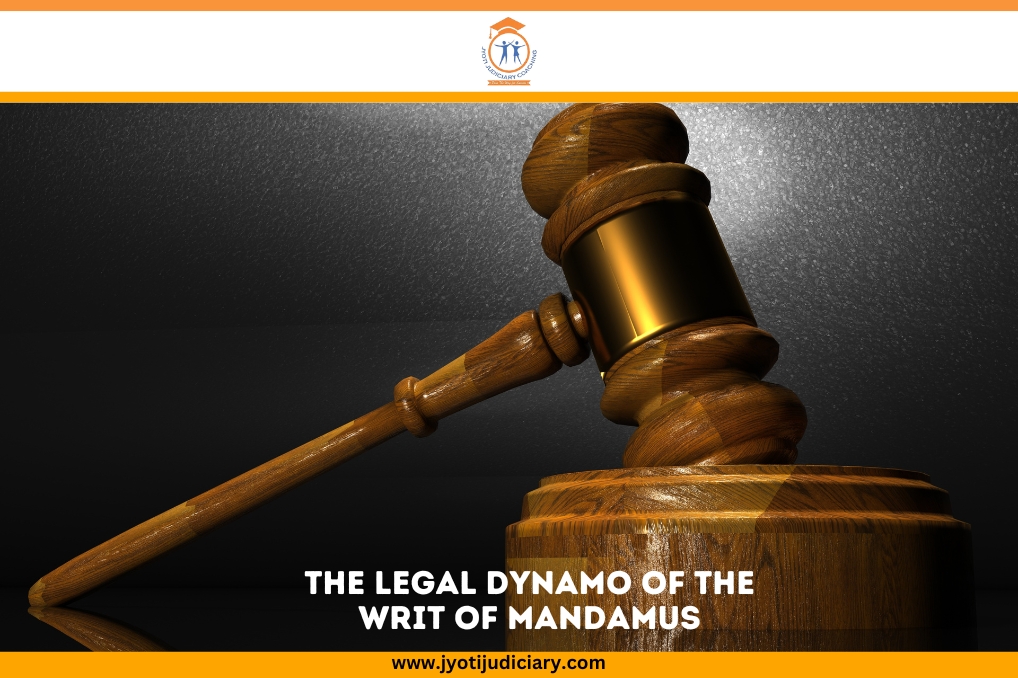
A strong judicial remedy that is essential to maintaining the rule of law and guaranteeing the accountability of public servants and authorities is the writ of mandamus. The writ of mandamus is a valuable weapon for legal redress in India, with a rich historical pedigree. The origins of the mandamus can be found in ancient India, when the king’s court would give royal orders, or “Adeshas,” to make sure public servants completed their tasks on schedule.
The Writ of Mandamus: Define Writ of Mandamus
The term “mandamus” literally means “command.” Public authorities of all stripes use the prerogative remedy of mandamus to compel the discharge of public responsibilities.
- A writ of mandamus requires the person or body to whom it is directed to take certain action.
- The demand is to fulfill a public or quasi-public obligation that the entity or individual has declined to fulfill and that cannot be enforced through the employment of any other legal remedy.
- Consequently, no mandamus shall be granted unless the petitioner is entitled to require the fulfillment of a legal obligation and the body that the writ is being sought against is obligated to carry out that obligation.
Mandamus Writ Petition: Features
- Primarily a public law remedy, a writ petition of Mandamus is typically unavailable for private wrongs.
- It is employed to uphold certain public rights or to compel public statutory authorities to carry out their duties and act appropriately.
- When there is an abuse of power or a failure to complete tasks, it can be used to impose justice.
- The most comprehensive kind of remedy is a mandamus decree.
- It takes the form of an order that is sent to any individual, business, or lower tribunal, requiring them to carry out any specific tasks that are relevant to their position and fall under the purview of public duty.
- Mandamus is not a writ of right; rather, it is granted only at the court’s discretion, and this discretion is not used to the petitioner’s advantage unless the writ accomplishes a justifiable and advantageous goal.
Law of Mandamus: Where this Writ Can be Issued?
- To have the tax that was unlawfully collected by the State reimbursed.
- Against a university if, to his detriment, they alter the rules after the candidate has taken the test.
- The harmed party may pursue an emergency writ of mandamus as a legal remedy if the Government fails to document or notify the parties of its decision to not file a reference under Section 12(5) of the Industrial Disputes Act, 1947.
- When an Income Tax Tribunal issues a directive and the Income Tax Officer declines to comply with the Tribunal’s orders.
- When the interest on the compensation sum is mistakenly refused by the land acquisition officer.
- When the petitioner is not in detention despite a detention order being issued against him.
Writ of Mandamus Cases
The mandamus case law is as follows:
- In the 1972 case of Bombay Municipality v Advance Builders, the State Government had also approved the urban planning scheme that the Bombay Municipality had produced. Still, a considerable period passed with nothing being done. The Court held that in cases when an authority wrongfully conferred with a power declined to utilize it, a writ of mandamus may be issued, and it ordered the municipality to carry out a planned project.
- In the 1962 case of Shivendra v Nalanda College, it was decided that mandamus would not be granted on the petition of a failed candidate since the candidate lacked the legal authority to be appointed after the college’s governing body had interviewed and evaluated the candidates’ applications.
Alternative Writ of Mandamus
- An alternative mandamus is a writ in its first or provisional form. When a court is not convinced that the respondent, the person or thing the writ is intended against, has complied with its legal obligations, the writ is issued.
- The alternative mandamus lays out the alleged deficiency or duty breach and directs the respondent to fulfill the obligation or furnish a legitimate explanation for their failure to do so.
- There is a time limit on the respondent’s response. The alternate mandamus may become a peremptory mandamus if the responder disregards it or does not offer a convincing justification.
Article 78 Mandamus in New York
- A Writ of Mandamus has the power to compel a government officer or agency to carry out a legal obligation.
- A Writ of Mandamus to Compel, for instance, could be filed under Article 78 to compel a government entity to render a decision on an application.
- In situations when a court has taken an excessively lengthy time to make a decision, one may also submit article 78 in the form of a Writ of Mandamus to Compel.
Writ of Mandamus FAQs
1. What is the writ of mandamus?
The mandamus writ is used to ensure that public officials remain within their authorized boundaries while performing their duties. The goal of mandamus, which must be applied in all situations without a clearly defined legal remedy, is to avoid chaos arising from the denial of justice.
2. What is a writ of mandamus against a government company?
A private entity or an individual if given a public responsibility. If a government firm neglects to carry out its mandated responsibilities, it may be subject to a writ of mandamus since it is an instrumentality or agency of the government carrying out public duties.
3. Who can apply for a writ of mandamus?
Anybody who has been injured by the neglect or abuse of such a public duty and is legally able to demand that it be fulfilled may file a petition with. Put simply, the court issues this writ when it feels that a certain officeholder is failing to carry out their legal obligations and is infringing upon the rights of individuals.
4. Can mandamus be issued against Parliament?
No other court has the authority to grant writs. It is not directed toward the president, the governor, the legislature of any state, private organizations, or specific individuals.
5. Can mandamus be issued against police officers?
Section 154(1) Cr. P.C. permits police agencies to issue writs of mandamus to enforce their statutory duties.
6. Can mandamus be issued against private individuals?
The Court made it clear that while writs might be issued against any private entity or individual, mandamus can only be used to enforce public duties.
7. What is Article 226 of the writ of mandamus?
Article 226 gives High Courts the power to writ, order, and direct any person or authority, including the government.
8. Is mandamus a fundamental right?
A writ of mandamus, which forbids the government or a public official from acting against an aggrieved party, is issued by the court to enforce fundamental rights. A High Court may issue a writ of mandamus for further reasons, but the Supreme Court may not.
9. What is a writ of mandamus under Article 32?
A subordinate court, a government official, a company, or another organization can obtain a writ of mandamus, which orders the execution of specific tasks or obligations.
10. What is the purpose of writing mandamus?
The Court would issue a writ of mandamus, preventing the public officer or government from implementing that order or conducting that act against the individual whose fundamental right has been violated, whenever they had done something that violated someone else’s basic right.
11. Which coaching is best for the judiciary?
The best judiciary coaching in Jaipur is provided by Jyoti Judiciary Coaching.
With the goal of giving students the best coaching available for law entrance exams including the CLAT, AILET, and various other state judiciary exams, Jyoti Judiciary Coaching, India’s Finest educational Platform, was established. Come enroll now with Jyoti Judiciary!
For any latest news, legal topics, judiciary exams notifications, patterns, etc watch Jyoti Judiciary’s YouTube channel for legal videos for any updates at https://youtube.com/@jyotijudiciarycoaching4852?si=2cwubh9d2A9urwJf









